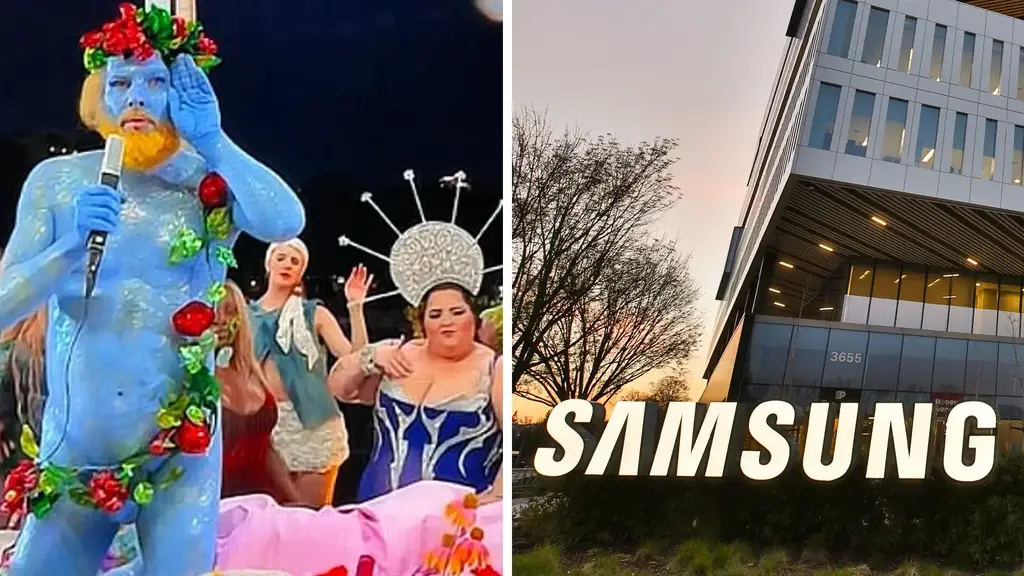In a dramatic shift in corporate sponsorship dynamics, Samsung Electronics has announced its decision to withdraw from a $1 billion advertising campaign with the International Olympic Committee (IOC). This move has stirred significant controversy, as Samsung cited the Olympics’ “woke agenda” as the primary reason for its withdrawal.
For nearly thirty years, Samsung has been a major sponsor of the Olympic Games, providing technological innovations that have enhanced the viewing experience for millions of fans worldwide. From virtual reality coverage to state-of-the-art mobile connectivity, Samsung’s contributions have been instrumental in bringing the Olympics into the digital age. The partnership was seen as mutually beneficial, marrying athletic excellence with cutting-edge technology.

However, this long-standing relationship has come to an abrupt halt. Samsung’s recent decision to pull out of the 2024 Paris Olympics advertising campaign marks a significant shift in its marketing strategy and highlights the growing tension between corporate sponsors and the evolving cultural landscape of major sporting events.
The catalyst for Samsung’s withdrawal was a controversial performance during the opening ceremony of the 2024 Paris Olympic Games. The ceremony featured drag queens and dancers in a segment that some viewers felt resembled Leonardo da Vinci’s “The Last Supper.” This performance drew immediate backlash from conservative audiences and religious groups, who accused the Olympics of promoting a “woke” agenda at the expense of traditional values.
Social media was flooded with criticism, with many decrying the performance as disrespectful and offensive. House Speaker Mike Johnson and Kansas City Chiefs kicker Harrison Butker were among the prominent figures who publicly condemned the ceremony, framing it as an affront to Christian values.
Samsung issued a press release detailing its reasons for withdrawing from the advertising campaign. “Samsung has always championed innovation, excellence, and unity through our partnership with the Olympic Games. However, recent events have highlighted a shift in focus that no longer aligns with our company’s mission and values. We believe that the Olympics should remain a celebration of athletic prowess and global unity, not a platform for divisive cultural agendas.”
The statement further explained, “As such, we have made the difficult decision to withdraw from our $1 billion advertising campaign for the 2024 Paris Olympics. We remain committed to supporting sports and athletes worldwide but must do so in a manner consistent with our principles.”
Samsung’s decision has sent shockwaves through both the advertising and sports industries. Analysts are divided on the potential impact of this move. Some believe that Samsung’s bold stance could resonate with a significant portion of its consumer base who share similar concerns about cultural shifts. Others warn that distancing itself from a high-profile event like the Olympics could result in a loss of brand visibility and market share.
Marketing expert Jonathan Miller commented, “This is a risky move for Samsung. While it may strengthen its relationship with consumers who are critical of ‘woke’ culture, it could also alienate younger, more progressive audiences who value inclusivity and social justice. The long-term impact on Samsung’s brand image will depend on how effectively they navigate this controversy.”
The International Olympic Committee has not yet released an official statement in response to Samsung’s withdrawal. However, insiders suggest that the committee is concerned about the potential ripple effects on other sponsors and the overall financial health of the games.
An anonymous source within the IOC stated, “Samsung’s decision is a significant blow. We rely heavily on our partnerships with global brands to fund the games and provide a world-class experience for athletes and viewers. We hope to address these concerns and reassure our sponsors that the Olympics remain a celebration of global unity and sporting excellence.”
Samsung’s withdrawal from the Olympic advertising campaign is part of a larger conversation about the role of corporations in social and cultural issues. As companies navigate an increasingly polarized landscape, decisions about sponsorships and partnerships are becoming more complex and fraught with potential backlash.
Samsung’s move reflects a growing trend among corporations to take stands on cultural and political issues, sometimes at the expense of longstanding partnerships. This trend is driven in part by the rise of social media, where public opinion can shift rapidly and companies must respond quickly to maintain their reputations.
In response to the fallout, Samsung has announced plans to redirect its advertising budget toward other sporting events and initiatives that align more closely with its values. The company is reportedly exploring partnerships with sports leagues and events that emphasize traditional athletic competition without the cultural and political overtones that have characterized recent Olympic Games.
“We are excited to explore new opportunities to support sports and athletes in ways that reflect our commitment to innovation and excellence,” the press release stated. “Our focus will be on fostering unity and celebrating the achievements of athletes worldwide.”
Samsung’s withdrawal from the $1 billion Olympic advertising campaign marks a significant moment in the intersection of sports, corporate sponsorship, and cultural values. As the company navigates the fallout from this decision, it will need to balance its brand integrity with the evolving expectations of its diverse consumer base.
The controversy also highlights the broader challenges faced by organizations like the IOC, which must reconcile the traditional values of their global audience with the evolving cultural landscape. How the Olympics and its sponsors address these challenges will shape the future of one of the world’s most beloved sporting events.
In the meantime, Samsung’s stance has sparked a heated debate, one that will likely continue as the 2024 Paris Olympics approach. Whether this move will ultimately benefit or harm Samsung remains to be seen, but it undeniably sets a precedent for how corporations engage with cultural and social issues in the future.





